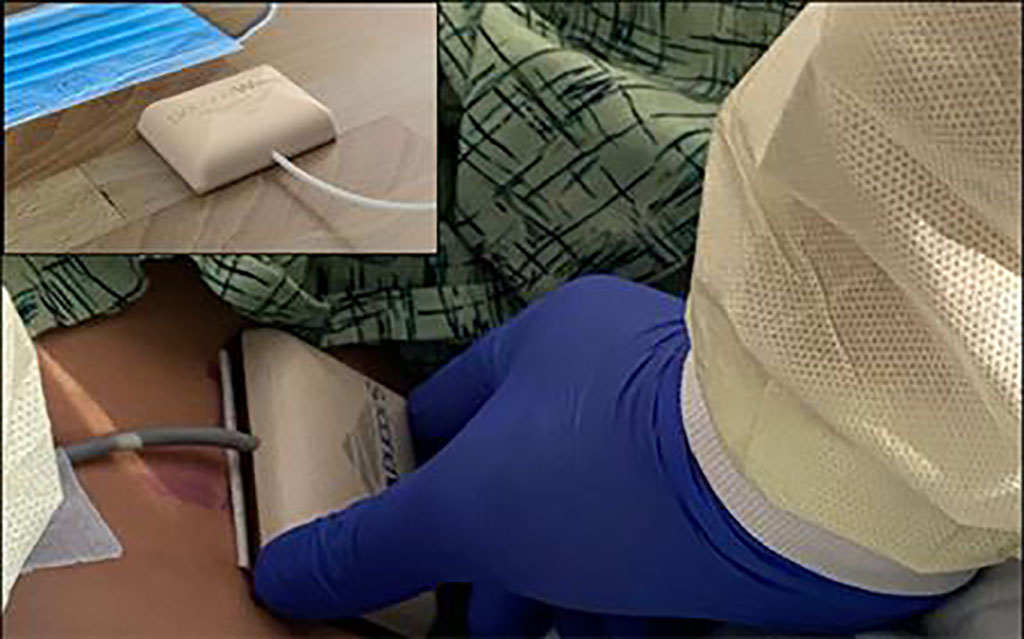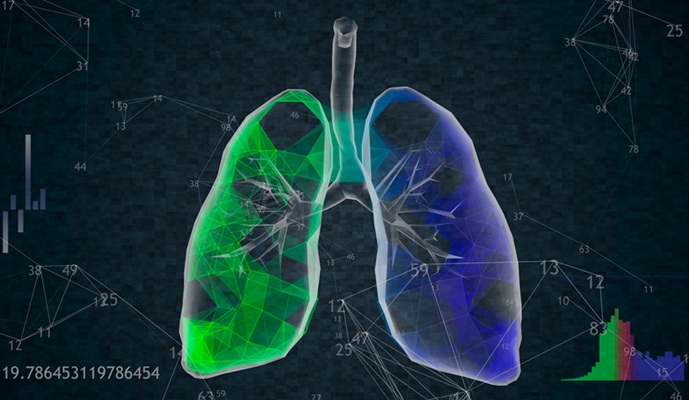Ultrasound Stimulation Reduces COVID-19-Related Inflammation and Decreases Length of Hospital Stays
|
By MedImaging International staff writers Posted on 14 May 2021 |

Image: Ultrasound Stimulation Reduces COVID-19-Related Inflammation and Decreases Length of Hospital Stays (Photo courtesy of SecondWave Systems)
Researchers have begun a pilot clinical trial to test the efficacy of using ultrasound to stimulate the spleen and reduce COVID-19-related inflammation, decreasing the length of hospital stays.
The two- to three-month study, called Ultrasound Neural and Immunomodulation Treatment Evaluation Study for COVID-19 or UNITE Study, by researchers at University of California San Diego School of Medicine (San Diego, CA, USA), will recruit 40 patients with severe COVID-19 symptoms. Half of the patients in the trial will be given ultrasound treatment daily for up to seven days, in addition to receiving anti-inflammatory drugs, such as remdesivir and dexamethasone, which are currently part of standard medical care. The other half - the control group - will receive only standard medical care.
In earlier rodent studies, stimulating the spleen with a non-invasive ultrasound device was shown to reduce inflammation. Researchers have also demonstrated the anti-inflammatory value of spleen stimulation in healthy human subjects and in human patients with rheumatoid arthritis (RA). Both RA and COVID-19 patients can suffer from a hyperinflammatory response driven by over-production of cytokines - proteins that signal and spur an inflammatory immune response. The resulting “cytokine storm” in COVID-19 patients can lead to acute respiratory distress syndrome, known as ARDS, which can be fatal.
A July 2020 study had demonstrated the effects of splenic stimulation in RA and healthy patients, and its potential in COVID-19 patients. Prior studies have also shown that electrical stimulation of the vagus nerve, which runs from the brain to the gut, using a cervical implant, reduces inflammation. Stimulating the spleen may activate the same anti-inflammatory pathways. The clinical trial will use an investigational device strategically placed on patients’ skin that generates low-intensity, focused ultrasound waves targeting the spleen. Treatment occurs daily for approximately 18 minutes for up to seven days.
“It’s a pilot study to evaluate whether ultrasound stimulation focused on the spleen can reduce inflammatory biomarkers in hospital patients infected with SARS-CoV-2,” said Imanuel Lerman, MD, associate professor of anesthesiology at UC San Diego School of Medicine and an affiliate of Qualcomm Institute at UC San Diego, where his lab is based. “This will allow us to determine whether treating patients this way can really affect clinical outcomes in COVID-19 infections.”
Related Links:
University of California San Diego School of Medicine
The two- to three-month study, called Ultrasound Neural and Immunomodulation Treatment Evaluation Study for COVID-19 or UNITE Study, by researchers at University of California San Diego School of Medicine (San Diego, CA, USA), will recruit 40 patients with severe COVID-19 symptoms. Half of the patients in the trial will be given ultrasound treatment daily for up to seven days, in addition to receiving anti-inflammatory drugs, such as remdesivir and dexamethasone, which are currently part of standard medical care. The other half - the control group - will receive only standard medical care.
In earlier rodent studies, stimulating the spleen with a non-invasive ultrasound device was shown to reduce inflammation. Researchers have also demonstrated the anti-inflammatory value of spleen stimulation in healthy human subjects and in human patients with rheumatoid arthritis (RA). Both RA and COVID-19 patients can suffer from a hyperinflammatory response driven by over-production of cytokines - proteins that signal and spur an inflammatory immune response. The resulting “cytokine storm” in COVID-19 patients can lead to acute respiratory distress syndrome, known as ARDS, which can be fatal.
A July 2020 study had demonstrated the effects of splenic stimulation in RA and healthy patients, and its potential in COVID-19 patients. Prior studies have also shown that electrical stimulation of the vagus nerve, which runs from the brain to the gut, using a cervical implant, reduces inflammation. Stimulating the spleen may activate the same anti-inflammatory pathways. The clinical trial will use an investigational device strategically placed on patients’ skin that generates low-intensity, focused ultrasound waves targeting the spleen. Treatment occurs daily for approximately 18 minutes for up to seven days.
“It’s a pilot study to evaluate whether ultrasound stimulation focused on the spleen can reduce inflammatory biomarkers in hospital patients infected with SARS-CoV-2,” said Imanuel Lerman, MD, associate professor of anesthesiology at UC San Diego School of Medicine and an affiliate of Qualcomm Institute at UC San Diego, where his lab is based. “This will allow us to determine whether treating patients this way can really affect clinical outcomes in COVID-19 infections.”
Related Links:
University of California San Diego School of Medicine
Latest Ultrasound News
- Reusable Gel Pad Made from Tamarind Seed Could Transform Ultrasound Examinations
- AI Model Accurately Detects Placenta Accreta in Pregnancy Before Delivery
- Portable Ultrasound Sensor to Enable Earlier Breast Cancer Detection
- Portable Imaging Scanner to Diagnose Lymphatic Disease in Real Time
- Imaging Technique Generates Simultaneous 3D Color Images of Soft-Tissue Structure and Vasculature
- Wearable Ultrasound Imaging System to Enable Real-Time Disease Monitoring
- Ultrasound Technique Visualizes Deep Blood Vessels in 3D Without Contrast Agents
- Ultrasound Probe Images Entire Organ in 4D

- Disposable Ultrasound Patch Performs Better Than Existing Devices
- Non-Invasive Ultrasound-Based Tool Accurately Detects Infant Meningitis
- Breakthrough Deep Learning Model Enhances Handheld 3D Medical Imaging
- Pain-Free Breast Imaging System Performs One Minute Cancer Scan
- Wireless Chronic Pain Management Device to Reduce Need for Painkillers and Surgery
- New Medical Ultrasound Imaging Technique Enables ICU Bedside Monitoring
- New Incision-Free Technique Halts Growth of Debilitating Brain Lesions
- AI-Powered Lung Ultrasound Outperforms Human Experts in Tuberculosis Diagnosis
Channels
Radiography
view channel
Routine Mammograms Could Predict Future Cardiovascular Disease in Women
Mammograms are widely used to screen for breast cancer, but they may also contain overlooked clues about cardiovascular health. Calcium deposits in the arteries of the breast signal stiffening blood vessels,... Read more
AI Detects Early Signs of Aging from Chest X-Rays
Chronological age does not always reflect how fast the body is truly aging, and current biological age tests often rely on DNA-based markers that may miss early organ-level decline. Detecting subtle, age-related... Read moreMRI
view channel
New Material Boosts MRI Image Quality
Magnetic resonance imaging (MRI) is a cornerstone of modern diagnostics, yet certain deep or anatomically complex tissues, including delicate structures of the eye and orbit, remain difficult to visualize clearly.... Read more
AI Model Reads and Diagnoses Brain MRI in Seconds
Brain MRI scans are critical for diagnosing strokes, hemorrhages, and other neurological disorders, but interpreting them can take hours or even days due to growing demand and limited specialist availability.... Read moreMRI Scan Breakthrough to Help Avoid Risky Invasive Tests for Heart Patients
Heart failure patients often require right heart catheterization to assess how severely their heart is struggling to pump blood, a procedure that involves inserting a tube into the heart to measure blood... Read more
MRI Scans Reveal Signature Patterns of Brain Activity to Predict Recovery from TBI
Recovery after traumatic brain injury (TBI) varies widely, with some patients regaining full function while others are left with lasting disabilities. Prognosis is especially difficult to assess in patients... Read moreUltrasound
view channel
Reusable Gel Pad Made from Tamarind Seed Could Transform Ultrasound Examinations
Ultrasound imaging depends on a conductive gel to eliminate air between the probe and the skin so sound waves can pass clearly into the body. While the imaging technology is fast, safe, and noninvasive,... Read more
AI Model Accurately Detects Placenta Accreta in Pregnancy Before Delivery
Placenta accreta spectrum (PAS) is a life-threatening pregnancy complication in which the placenta abnormally attaches to the uterine wall. The condition is a leading cause of maternal mortality and morbidity... Read moreNuclear Medicine
view channel
Radiopharmaceutical Molecule Marker to Improve Choice of Bladder Cancer Therapies
Targeted cancer therapies only work when tumor cells express the specific molecular structures they are designed to attack. In urothelial carcinoma, a common form of bladder cancer, the cell surface protein... Read more
Cancer “Flashlight” Shows Who Can Benefit from Targeted Treatments
Targeted cancer therapies can be highly effective, but only when a patient’s tumor expresses the specific protein the treatment is designed to attack. Determining this usually requires biopsies or advanced... Read moreGeneral/Advanced Imaging
view channel
AI Tool Predicts Side Effects from Lung Cancer Treatment
Radiation therapy is a central treatment for lung cancer, but even carefully targeted radiation can affect surrounding healthy tissue. Patients may develop side effects such as lung inflammation, coughing,... Read more
AI Tool Offers Prognosis for Patients with Head and Neck Cancer
Oropharyngeal cancer is a form of head and neck cancer that can spread through lymph nodes, significantly affecting survival and treatment decisions. Current therapies often involve combinations of surgery,... Read moreImaging IT
view channel
New Google Cloud Medical Imaging Suite Makes Imaging Healthcare Data More Accessible
Medical imaging is a critical tool used to diagnose patients, and there are billions of medical images scanned globally each year. Imaging data accounts for about 90% of all healthcare data1 and, until... Read more
Global AI in Medical Diagnostics Market to Be Driven by Demand for Image Recognition in Radiology
The global artificial intelligence (AI) in medical diagnostics market is expanding with early disease detection being one of its key applications and image recognition becoming a compelling consumer proposition... Read moreIndustry News
view channel
Nuclear Medicine Set for Continued Growth Driven by Demand for Precision Diagnostics
Clinical imaging services face rising demand for precise molecular diagnostics and targeted radiopharmaceutical therapy as cancer and chronic disease rates climb. A new market analysis projects rapid expansion... Read more























